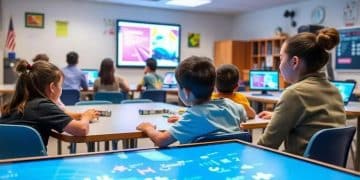Remote learning: how to thrive in a digital classroom

Anúncios
Remote learning enhances education through flexibility, accessibility, and various tools, enabling personalized experiences that improve student engagement and learning outcomes.
Remote learning is transforming education, allowing students to engage from anywhere. Are you curious about how to make the most of this opportunity? Let’s dive into some effective strategies and tools!
Understanding the concept of remote learning
Understanding remote learning is essential in today’s educational landscape. This method of education allows students to learn from anywhere in the world using a device and internet connection. It opens new doors for accessibility and flexibility in learning.
The Basics of Remote Learning
At its core, remote learning involves online classes or courses that students attend from home. This approach significantly differs from traditional classroom settings. It offers students the ability to set their own pace and engage with materials as they see fit.
Key Features of Remote Learning
- Flexibility: Students can choose when and where to study.
- Accessibility: Learning materials are often available at any time, making them easy to revisit.
- Variety of Tools: Students use different platforms for discussions, lectures, and assignments.
These features make remote learning particularly attractive but also require students to develop strong time management skills. Managing your schedule effectively can influence your learning experience positively.
Effective communication with instructors and peers is another essential component of successful remote learning. Participating actively in discussions and asking questions can enhance understanding and retention of the material.
With the rise of online learning platforms, students now have access to numerous resources that support their educational endeavors. Websites, apps, and online libraries provide valuable information and facilitate more interactive learning experiences.
Overall, understanding the concept of remote learning allows students to take full advantage of the innovative tools and methods now available. By embracing this style of learning, they can cultivate essential skills for the future.
Key benefits of remote education

Exploring the key benefits of remote education reveals how this approach can enhance learning experiences. Many students today are discovering how this flexible method provides valuable advantages not found in traditional classrooms.
Flexibility in Learning
One of the main benefits is flexibility. Students can learn at their own pace, which allows them to revisit materials as needed. This ensures a better understanding of concepts.
Accessibility and Inclusivity
Remote education also breaks down physical barriers. Students from different locations can access quality education without travel. This approach is especially beneficial for those with disabilities or personal commitments that may hinder traditional attendance.
Cost-Effective Learning
- Reduced Expenses: Students save money on transportation and housing.
- Affordable Resources: Many online courses are cheaper than on-campus alternatives.
- No Commuting: Learning from home eliminates travel-related costs.
Cost savings can make education more accessible for many. At the same time, remote education promotes personalized learning experiences. Students can tailor their schedules and study methods to fit their individual needs.
The use of technology in remote education can improve tech literacy. As students navigate various online platforms, they gain vital skills for the modern workplace. These skills are invaluable for future careers, making them more marketable to employers.
Finally, remote education encourages self-discipline. Students learn to manage their time effectively, balancing studies with personal responsibilities. This skill is crucial for personal and professional success.
Effective strategies for successful online learning
Employing effective strategies for successful online learning can significantly enhance the educational experience. With the rise of remote education, it’s important to know how to make the most of it. Every student can benefit from specific techniques that improve focus and retention.
Creating a Structured Study Environment
One key strategy is to have a structured study environment. Choose a quiet spot where you can concentrate without distractions. Having a designated space helps signal your brain that it is time to learn.
Establishing a Routine
Another effective approach is establishing a regular routine. Setting aside specific times for studying helps maintain discipline. Consistency reinforces learning habits and makes it easier to keep up with coursework.
- Time Management: Use planners or calendars to keep track of assignments and deadlines.
- Set Goals: Break down larger tasks into smaller, manageable goals.
- Limit Distractions: Identify what distracts you and minimize those interruptions.
Additionally, engaging actively with materials can enhance understanding. Take notes during lectures or discussions and highlight key points. This practice fosters better retention of information.
Joining study groups can also be beneficial. Collaborating with peers allows for the exchange of ideas and perspectives. Group studies encourage accountability and can make learning more enjoyable.
Finally, leveraging technology is crucial for online success. Familiarize yourself with various tools that enhance learning, such as educational apps, virtual classrooms, and online resources. These tools can facilitate smoother interactions and more effective studying.
Tools and resources for enhancing remote learning

Utilizing the right tools and resources for enhancing remote learning can significantly improve the online education experience. With the right support, students can engage more effectively and boost their understanding of complex subjects.
Essential Tools for Online Learning
First, it’s essential to have a reliable computer and internet connection. These are the foundational tools for remote learning, enabling access to courses, videos, and discussions. Next, a good pair of headphones with a microphone can enhance audio quality, making online communication much clearer.
Learning Management Systems
Many educational institutions use Learning Management Systems (LMS) like Canvas or Moodle. LMS platforms allow students to track their assignments and interact with peers and instructors. These systems provide helpful features such as discussion forums, quizzes, and submission portals, all in one place.
- Resource Sharing: Easy access to shared learning materials and resources.
- Feedback Tools: Immediate feedback from instructors through assignments and quizzes.
- Peer Interaction: Opportunities to collaborate with classmates on group projects.
An additional benefit of LMS is the ability to integrate other resources. For example, students can access digital libraries, which offer a wealth of information, including eBooks, research papers, and articles to support their studies.
Another valuable resource is educational apps. Applications like Quizlet and Khan Academy provide interactive learning experiences through games, quizzes, and instructional videos. These tools encourage students to engage with the material in fun and meaningful ways.
Finally, video conferencing tools such as Zoom and Microsoft Teams enable real-time communication. These platforms support live classes, ensuring students can interact with their teachers and ask questions just like in a physical classroom.
\n
FAQ – Common Questions about Remote Learning
What are the key benefits of remote learning?
Remote learning offers flexibility, accessibility, and personalized learning experiences, allowing students to study at their own pace.
What tools do I need for effective online learning?
Essential tools include a reliable computer, internet connection, headphones, and access to learning management systems.
How can I stay focused while studying online?
Creating a dedicated study space, establishing a routine, and limiting distractions can help maintain focus during online learning.
Are there resources to support online learning?
Yes, many resources like educational apps, digital libraries, and video conferencing tools are available to enhance the remote learning experience.






